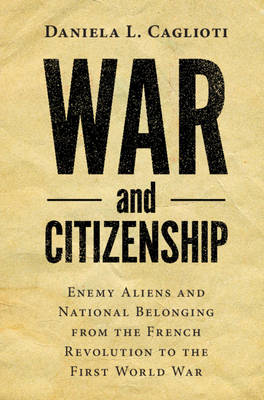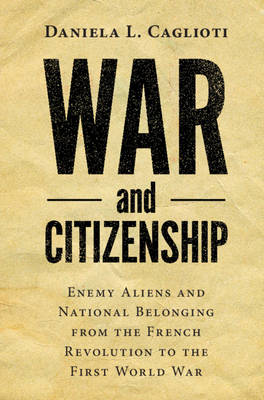
- Afhalen na 1 uur in een winkel met voorraad
- Gratis thuislevering in België vanaf € 30
- Ruim aanbod met 7 miljoen producten
- Afhalen na 1 uur in een winkel met voorraad
- Gratis thuislevering in België vanaf € 30
- Ruim aanbod met 7 miljoen producten
Zoeken
War and Citizenship
Enemy Aliens and National Belonging from the French Revolution to the First World War
Daniela L Caglioti
€ 64,95
+ 129 punten
Omschrijving
What did it mean to be an alien, and in particular an enemy alien, in the interstate conflicts that occurred over the nineteenth century and that climaxed in the First World War? In this ambitious and broad-ranging study, Daniela L. Caglioti highlights the many ways in which belligerent countries throughout the world mobilized populations along the member/non-member divide, redefined inclusion and exclusion, and refashioned notions and practices of citizenship. She examines what it meant to be an alien in wartime, how the treatment of aliens in wartime interfered with sovereignty and the rule of law, and how that treatment affected population policies, individual and human rights, and conceptions of belonging. Concentrating on the gulf between citizens and foreigners and on the dilemma of balancing rights and security in wartime, Caglioti highlights how each country, regardless of its political system, chose national security even if this meant reducing freedom, discriminating among citizens and non-citizens, and violating international law.
Specificaties
Betrokkenen
- Auteur(s):
- Uitgeverij:
Inhoud
- Aantal bladzijden:
- 466
- Taal:
- Engels
- Reeks:
Eigenschappen
- Productcode (EAN):
- 9781108489423
- Verschijningsdatum:
- 17/12/2020
- Uitvoering:
- Hardcover
- Formaat:
- Genaaid
- Afmetingen:
- 196 mm x 231 mm
- Gewicht:
- 816 g

Alleen bij Standaard Boekhandel
+ 129 punten op je klantenkaart van Standaard Boekhandel
Beoordelingen
We publiceren alleen reviews die voldoen aan de voorwaarden voor reviews. Bekijk onze voorwaarden voor reviews.











